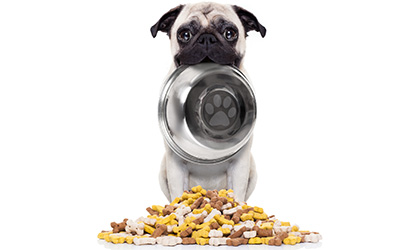
Nutrition Facts
Feeding your feline a well balanced diet is the secret to securing his happiness, longevity and overall wellbeing. For the purr-fect teeth-to-tail nourishment, you need to strike the correct ratio between all the essential food groups: water, protein, taurine, fat, carbohydrates, minerals and vitamins.
Water
Kitty’s body is roughly 80% water, so as with his canine counterparts, hydration is key here. H20 is needed to regulate body temperature, facilitate metabolism and digestion, flush waste products and feed cells. Always provide your little fur ball with plenty of fresh, clean water, particularly at meal times. Oh, and as for that saucer of milk – forget it. The notion that all cats are avid milk-guzzlers is a common misconception. In truth, they simply can’t digest it!
Protein
You only have to look at their teeth to understand felines are fully-fledged meat-eaters. You see, unlike dogs, cats are ‘obligate carnivores’, meaning they can’t physically survive without meat (warning: don’t be tempted to put kitty on a vegetarian or vegan diet!) Animal-based products aren’t only a readily available source of protein needed for muscle growth, tissue repair and regeneration, but they’re also abundant in essential amino acids that will nourish kitty’s body for all nine lives. Your cat’s diet should predominantly be protein based, deriving from sources like chicken, lamb, beef, organ meat and fish.
Taurine
Since it’s so fundamental to feline health, taurine – one of the essential amino acids found in protein – is worthy of a mention in its own right. Taurine performs a variety of functions in your cat’s body: it promotes heart health, maintains good eyesight, and supports pregnant queens and their kittens.
Essential Fatty Acids
As well as providing kitty with a top source of energy, essential fatty acids (and particularly omega 3s), help to promote a healthy metabolism and digestion. Better still, these compounds are responsible for keeping your feline’s fur silky smooth and oh-so-huggable too. Animal fats, and vegetable and plant oils are all rich fat sources.
Carbohydrates
Though carbs aren’t a vital part of your feline’s diet (they should only form around 10% of his daily food regimen), cereal grains such as wheat, rice, corn, barley and oats still supply a means of slow-release energy. Carbohydrates promote optimal digestive health and normal intestinal function too.
Minerals
Minerals lay the foundation for healthy teeth, bones and skin. Some of the core minerals your furry friend needs include calcium, phosphorus, potassium, magnesium and sodium chloride. Balance is key here; too much or too little of one compound could lead to problems of its own. Liver, fish and meat are chock-full of these nourishing nutrients.
Vitamins
Your little fur ball requires a number of vitamins to remain in tip-top condition. Essential compounds like vitamins A, D, E and K (fat-soluble) and vitamins C and B (water-soluble) support a healthy metabolism, good vision, cell regeneration, and bone growth and strength. Animal-based foods are loaded with tons of vitamin goodness.
Diet Tips
-
Constantly changing your cat’s diet could spark digestive problems. If you need to alter kitty’s food regimen, always introduce new products slowly. This is the most successful way to ease your companion into the dietary change. Start by offering the new food in your friend’s regular bowl and place his old food in a different bowl. Offer 25% new food and 75% old food. Slowly change the portions over the next three days, gradually increasing the amount of the new food and decreasing the old food. At the end of the weaning process, you should be feeding your furry pal 100% new food.
-
Never put your kitty’s dinner near his litter tray. He will only turn his nose up at food near his toilet site (too right!)
-
Cats have an uncanny super power to smell changes in the world around them. Oddly enough, a new bowl could even put him off his dinner; with some fussy-feline’s refusing to eat from plastic or rubber bowls entirely. The solution? A ceramic bowl – one that’s shallow and wide enough too. (Did you know cats hate it when their whiskers brush against the side of anything? It’s their ultimate pet peeve!)
-
Is your feline friend off his food? Don’t assume that he’s simply bored with the content of his dinner. You may want to look for other factors that could be causing him stress and affecting his appetite. Is there a dental issue making him reluctant to eat? Has a family member left or died? Has another animal been added to your household? Have you moved house? Once you remove the culprit stressor, kitty will no doubt return to his usual eating habits. Bottom line: if your cat seems to be lively, happy and healthy, and he has clear eyes and a silky-soft coat, then there’s usually little cause for concern.
-
Always provide access to plenty of clean, fresh drinking water at meal times
You Might Also Like

Keri
Keri Filtness has worked in the Nutrition Industry for 19 years. She is regularly called upon for her professional comments on health and nutrition related news. Her opinions have been featured by BBC3, Prima, Vitality, The Mirror, Woman’s Own and Cycling Weekly, amongst others. She has also worked one to one with journalists, analysing their diets and health concerns and recommending changes and additions, where appropriate.
View More



